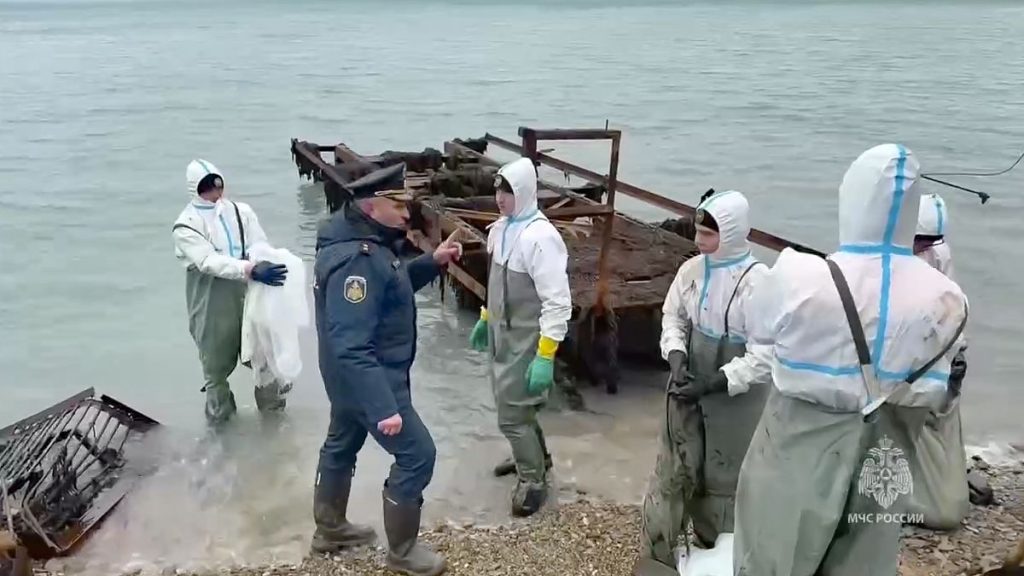The Kerch Strait, a vital maritime passage connecting the Sea of Azov to the Black Sea, has become the epicenter of an unfolding environmental crisis. A month after two tankers were ravaged by a storm, resulting in a significant oil spill, the situation continues to deteriorate, prompting a high-level emergency response from Russian authorities. The spill, now recognized as one of the most substantial environmental challenges faced by Russia in recent years, has spurred the deployment of a specialized task force, headed by Emergency Situations Minister Alexander Kurenkov, to the affected region. The gravity of the situation is underscored by the contamination spreading along the coastline and the ongoing leakage of fuel oil from the damaged Volgoneft-239 tanker. The incident has not only highlighted the vulnerability of the region’s delicate ecosystem but also reignited tensions between Russia and Ukraine, given the strait’s strategic importance and disputed status.
The scale of the environmental disaster is becoming increasingly apparent. Over 155,000 tons of contaminated sand and soil have been collected since the initial spill, a stark testament to the extent of the pollution. The heavy, low-quality oil product known as mazut has traveled a considerable distance, reaching the Berdyansk Spit, some 145 kilometers north of the Kerch Strait, contaminating a stretch of coastline over 14 kilometers long. The spill’s impact has also been felt in Crimea, where oil has reached the shores of Sevastopol, the peninsula’s largest city, triggering a regional emergency. The continued leakage from the damaged tanker poses an ongoing threat, and efforts are underway to pump out the remaining oil from the vessel’s stern. This complex operation requires specialized equipment and expertise, further emphasizing the magnitude of the challenge.
The Russian government’s response, initially perceived as slow and inadequate, has intensified following President Vladimir Putin’s call for escalated action. The deployment of the emergency task force signals a heightened level of concern and a commitment to addressing the crisis. However, this response has been met with criticism from Ukraine, which accuses Russia of downplaying the initial impact and only taking significant action after the scale of the disaster became undeniable. This accusation underscores the existing geopolitical tensions surrounding the Kerch Strait and highlights the complexities of managing a transboundary environmental crisis in a politically charged environment.
Ukraine’s condemnation of Russia’s handling of the spill goes beyond mere criticism of the response time. It points to a pattern of Russian behavior, accusing Moscow of consistently neglecting environmental concerns and then attempting to evade responsibility for the consequences. This alleged pattern, according to Ukraine, underscores Russia’s international irresponsibility and its disregard for the shared environmental resources of the region. The Ukrainian government has called for further sanctions against Russian tankers, arguing that such measures are necessary to deter future negligence and ensure accountability for environmental damage. This call for sanctions further exacerbates the existing tensions and highlights the potential for environmental disasters to escalate geopolitical conflicts.
The Kerch Strait’s strategic importance as a major shipping route adds another layer of complexity to the situation. The strait provides access to the Sea of Azov, crucial for trade and transportation in the region. The spill’s impact on shipping and maritime activities remains a concern, with potential disruptions to trade and economic activities. Furthermore, the incident raises questions about the safety regulations and oversight of maritime traffic in the strait, highlighting the need for enhanced safety measures to prevent future incidents. The long-term consequences of the spill on the marine environment and the region’s economy are yet to be fully understood, but the immediate impact is evident in the extensive contamination and the disruption of local communities.
The oil spill in the Kerch Strait serves as a stark reminder of the interconnectedness of environmental and geopolitical issues. The incident has not only caused significant environmental damage but has also reignited existing tensions between Russia and Ukraine. The accusations of negligence, the calls for sanctions, and the disputed status of the Kerch Strait all contribute to a complex and challenging situation. The ongoing efforts to contain the spill and mitigate its impact will require international cooperation and a commitment to addressing the underlying issues that contribute to such disasters. The long-term consequences of this environmental crisis will undoubtedly have far-reaching implications for the region and serve as a crucial case study in the intersection of environmental protection and geopolitical conflict.














